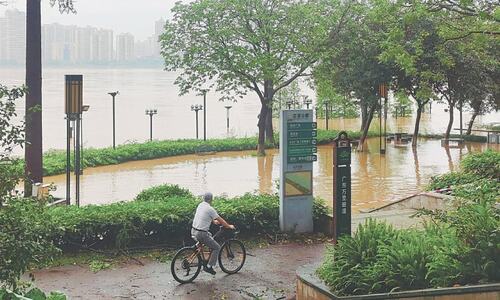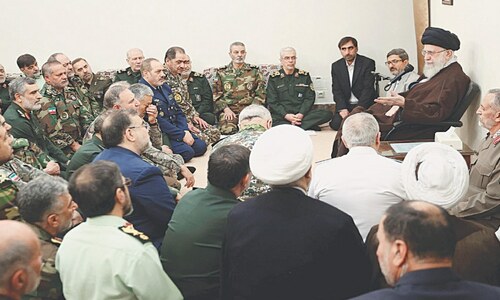From the moment the three judges of the special bench set up to try retired General Pervez Musharraf for treason entered the cold auditorium on Thursday morning, they faced a crowd of unrelentingly aggressive lawyers. Most of them offering arguments were far more senior to those seated on the podium, under a huge painting of a young Jinnah clad in a suit, against the backdrop of a library.
On one side of the makeshift courtroom was what appeared to be the most formidable defence team put together in recent times. From the glassy-eyed Jadugar of Jeddah to Anwar Mansoor Khan to Khalid Ranjha and Ahmed Raza Kasuri — the legal eagles were ready to fight for their client. What’s not clear, however, is what attracted the motley crew to the case: the cause or simply the moolah.
On the other side was the thickset Akram Sheikh, ‘heavyweight’ enough to single-handedly take on the legal galaxy.
As it happened, the first salvo on the judges was a gentle one. In his soft-spoken manner, Khan, a former attorney general, spoke about his ‘perturbed state of mind’. He said it had been framed by ‘namaloom afraad’ — not the Karachi variety obviously — who had kept knocking on his door all night. This harassment, he felt, was not only unacceptable but also enough to adjourn the proceedings (if not scuttle them altogether) to Monday.
The judges were not impressed.
The heavy guns were then brought out.
As Sharifuddin Pirzada was helped up to the rostrum, one of his co-counsel, Ibrahim Satti, accused Sheikh of having threatened the entire defence team.
Satti told the bench that in response to Kasuri’s allegations a day earlier — who had told the court that Sheikh was “Nawaz Sharif’s secretary” — Sheikh had, before the judges appeared, threatened to unleash “a thousand monsters” on Pirzada & Co.
“Monsters?” whispered those seated on the low green chairs of the auditorium to confirm that they had heard it right. An unrepentant Shaikh raised the temperature in the room by admitting to the entire conversation.
In the ensuing pandemonium, Khan and others walked out, oblivious that Pirzada was still hanging on to the podium (literally) and talking to the judges.
“One can only hope that this is his last case,” remarked a journalist. “But what if there’s another PCO to be defended?” mused another one, ever a pessimist.
But the ‘mother of all walk-outs’ lasted only as long as their client’s resolve to be a politician — instead of an invulnerable dictator — and face courts and the tribulations of a political career.
They returned soon enough as Pirzada had in their absence answered in the affirmative (with the qualification of “probably”) when the judges asked if Musharraf was going to appear in court. A day earlier the court had ordered that he be produced on Thursday.
As a result, the former dictator had been expected at nine-thirty in the morning. But he was missing when the trial and fireworks began, though the Rangers were present not just inside the auditorium but also around the small building which is located right next to the huge prime minister’s secretariat that Nawaz Sharif now works out of.
By eleven-thirty, it was being whispered that he had left for the court.
But as his lawyers continued to wrangle for an adjournment, it was suddenly announced by a police official that Musharraf had got a ‘heart problem’ and was diverted to the AFIC, apparently the last refuge of ‘faujis’ being chased by courts.
Long before the news came, though, few had believed that he would actually turn up — his appearance in court would have led to charges being framed; Musharraf becoming an accused instead of simply being a suspect; and his trial for treason finally getting under way.
And this is precisely what his lawyers focused on avoiding.
They had thrown a raft of petitions at courts in general — challenging the formation of the bench of the special court; the appointment of the prosecutor; and the trial of Musharraf in a civilian court. They have now filed these petitions with the special court after they were rejected by regular courts.
Their argument on Thursday was that the trial could not begin till these objections are addressed.
And then there is the quiet campaign about harassment (remember Khan’s ‘namaloom afraad’) and unfairness.
One of the less high-profile lawyers held forth in front of a few hacks about the unfairness of the trial. “This would never happen in England,” he said. He ran off before he could be asked if a dictator that fired a judge and imposed a state of emergency “would happen in good ol’ England”.—Arifa Noor















































